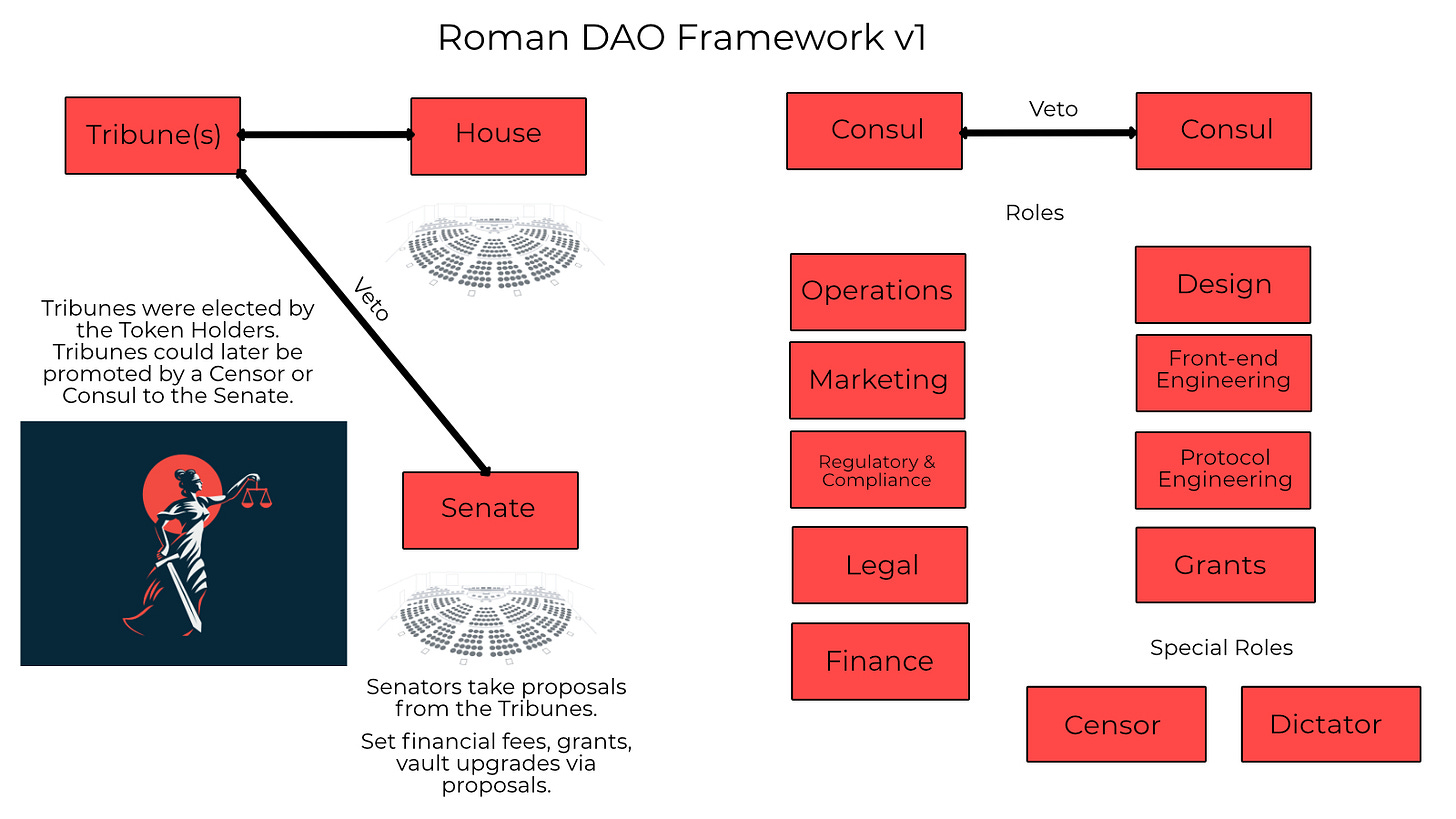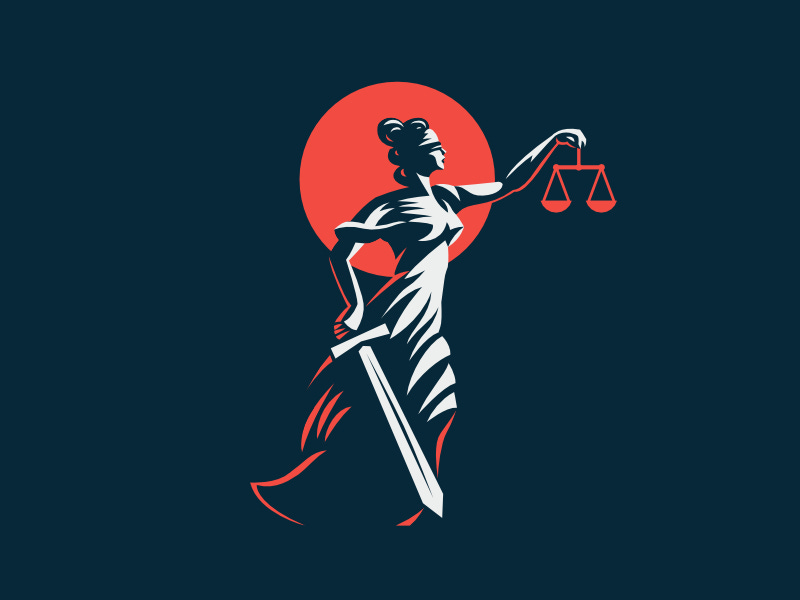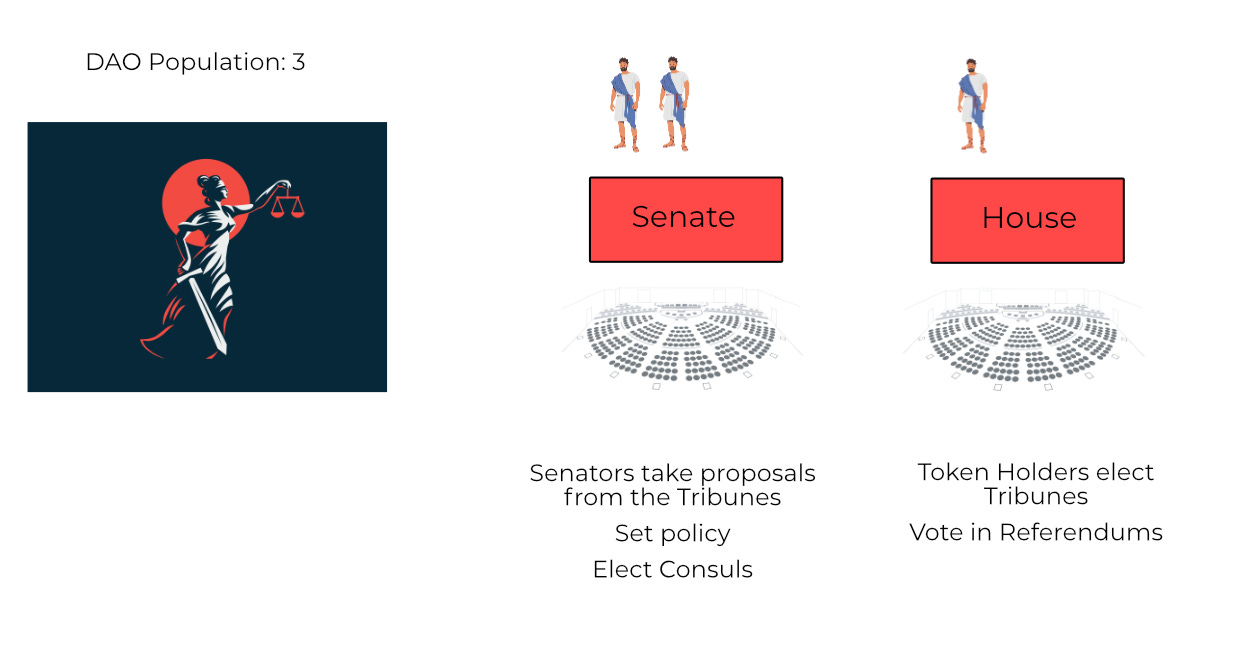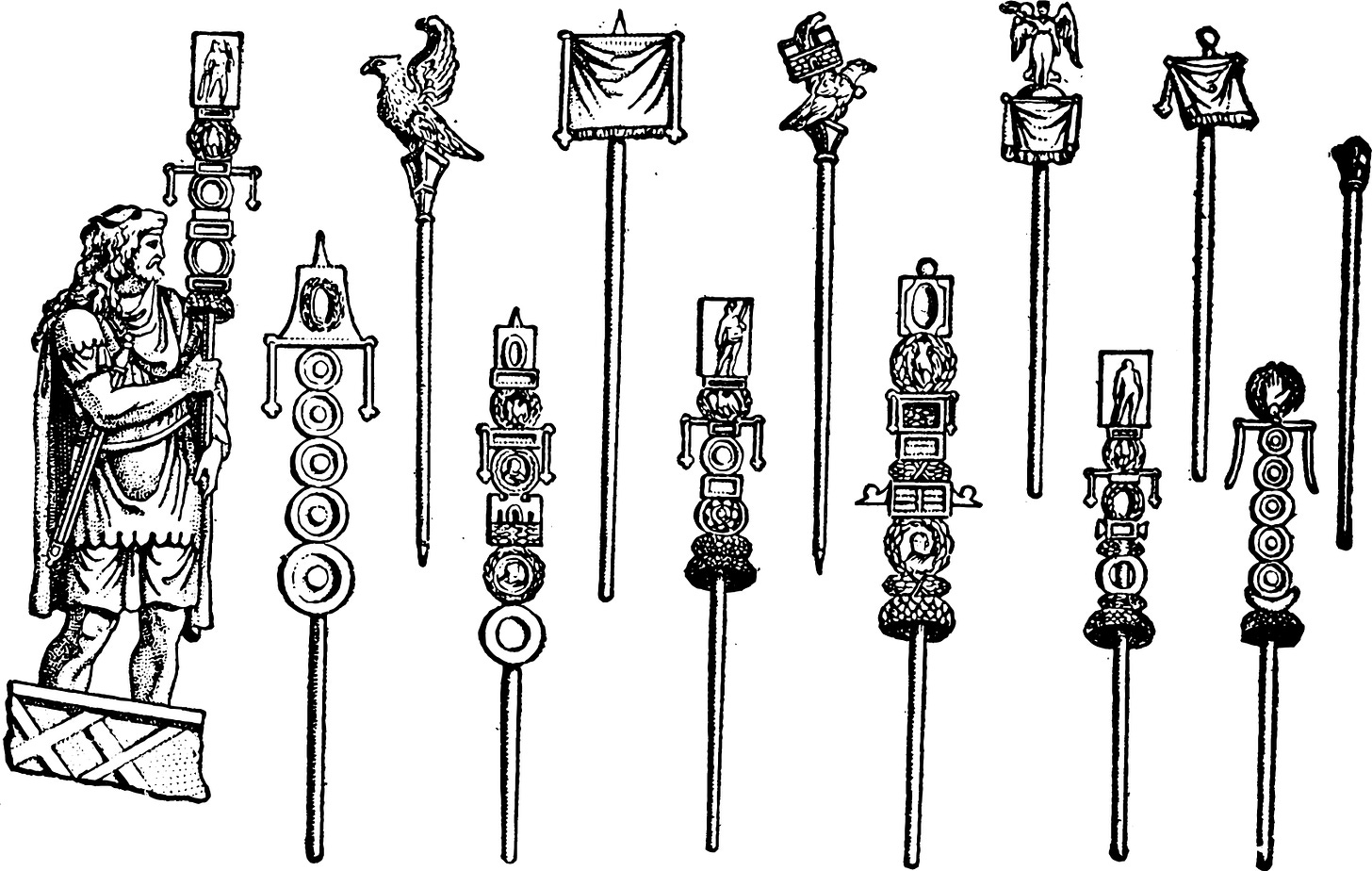Introduction to a Roman DAO Framework
I was listening to a few DAO meetups about a month back and the panelists were discussing DAOs both in the legal sense (where do I send the invoice?) and the development of human resources (how do you handle roles?).
Honestly I was pretty disappointed in the answers, not because the panelists weren’t fantastic people building on great ideas; just that they didn’t seem to know what to do with a traditional top-down hierarchy, especially when it came to dealing with a few major issues such as whale protection and role designation.
As a business owner myself, some successful, some dead and gone, I would argue that one very important business skill we hear about, but probably not enough of is ‘delegating’.
Delegating: A person authorized to act as representative for another; a deputy or agent.
When you are handing out roles in a DAO you are delegating them to that person. Now the obvious train of thought would be that why don’t we just use what already works: President, VP, Treasurer, Secretary, Board of Directors and so on. Yet, the reason we try to somewhat re-invent the wheel for these sorts of org. structures is that crypto in meant to be fast - like 100,000 TPS fast.
Crypto being what crypto is it’s become a bit of a calling card for DAOs. We need quick decision making in this environment, it’s UTC time, we need to VOTE!
When I first started tinkering in my thoughts about the Roman Republic governance system and how it could apply to crypto it was an exciting moment. Now that I’ve tried to work through how decision-making would work I’m an unconscionable zealot.
I’m very carefully going to get my hopes up and say that this thing has some serious legs. Sure, I’m going to have to get some help on an actual coded framework, not just this walkthrough. Yes, I’m going to have to parse through a lot of constitutional stuff by the Metagovernance people, but you know what. I’m excited to do it.
There is a fair amount of negative DAO sentiment at the moment so I thought I would revitalize the discussion by adding an ancient ally in governance; our friends the Roman Republic, and much later after a civil service was added - the Roman Empire.
If you love Roman history you will probably love this framework, thanks again to all my new CT friends I have a met from writing these articles. As you all know I’m always happy to talk governance, especially during these exciting crypto times.
If you are just finding this as your first article on my Roman Laws of Crypto series I suggest you check out:
This is not necessary, but will help in understanding the roles that Consuls, Censors, Tribunes and others play in a Roman DAO framework that I am attempting to lay out for you.
Without further ado I’m happy to present you part III of my Roman Laws of Crypto.
How Do We Create a Roman DAO?
It’s finally come to this - how we get things done. It’s the third Roman article so I best be making a mark, or getting out of the way. DAOs are supposed to be harder, better, faster, stronger.
Now that you’re presently in the proper headspace we present the step-by-step, absolutely-free, power-DAO governance-creation utility.
Keep in mind that I am aware of the movement by many crypto-enthusiast, law types to do something along the lines of what the Metagovernance Project is attempting to create and I fully agree with this line of thinking.
I’m fully supportive of zero, or minimally worded governance proposals that are actually more practically embedded into boilerplate constitutional terms that actually have been vetted by lawyers, or used in the legal wilderness.
Although smart contracts are promising and increasingly important, they alone cannot govern communities; traditional constitutions and declarations of rights are still crucial for good governance. (Metagovernance Project)
Yes, yes, and more yes. I will attempt to build a default constitution for this Roman DAO framework, but I’ll probably save that for Part V, as Part IV is mostly written and is more fun comparisons of the Roman economy versus crypto challenges and worldwide Politik. Enough future ideas, more Roman DAOing!
Re-Introduction to the new Roman Roles
Feel free to skip this part if you’ve already read the first two articles.
Consuls (role)
Come in pairs, can veto each other. Vetoes have consequences, mostly social. Consuls existed because prior to the Republic the Romans had just lived through some truly, horrible, tyrannical kings. In order to protect themselves from the inevitable corruption of one man with too much power the Romans decided that there should always be two men in charge. This did cause problems in certain situations, but mostly worked well for the 500+ years of the Roman Republic. Consuls are also the only role(other than Censor) capable of adding OR removing Senators from their class.
Tribunes (role)
Can be one, or many. Usually in proportion to the population of the House. When Rome faced it’s first serious domestic challenge due to the lack of rights given to non-Patrician families they were forced to create the Tribunes. They were fighting all the wars, farming all lands, and had no say in their daily lives. Eventually the plebeians were given the right to have one of the two Consuls be elected from their ranks, but I am foregoing that right for now as crypto might need a few hundred years to get to that point just like the Romans did. Tribunes are an interesting role as they are elected from the House (i.e. Token Holders), and are basically a Whale Protection System for your Roman DAO. Proposals from the House are filtered through the Tribunes, and any Tribune can present a proposal to the Senate who must vote on the proposal.
Senators (class)
The chosen few that get the privilege to vote on proposals in your Roman DAO. Consuls must come from the Senate, so a Consul is a role, NOT a class. Senators are very important to your Roman DAO, less is probably better at first, and do not under any circumstances allow untrustworthy whales in there. Better to keep them in the House for a little while at least. I haven’t been specific on this yet, but Senators get 1 vote per individual, Token Holders in the House can vote with their token largesse. When your DAO gets a bit bigger you can bring in the Censor to hunt down sybil attacks - since the Senate should be relatively small compared to your House, it should be easier to fish out alt accounts and behead them!
Dictator (role)
I’m bringing it back! Originally the Dictator is as we understand it today, just minus a lot of raised arms and poor social morality. Dictators can only come about via special Senate votes, or the rare instance of a Consul vetoing another Consul. This triggers an automatic election that has the option of voting for a Dictator to break the morass.
Censors (role)
The trusted treasury warden of your Roman DAO, also can add, or remove Senators from their class. Most likely unnecessary until your DAO has grown large enough to justify the advanced treasury and Senator management. They also can be expected to have a large say in Tokenomics, although this is more a suggestion than a requirement.
Alright I think this might be enough prep to take you into my Roman DAO mindset.
Push PLAY on your Daft Punk playlist, or reasonable alternative, and move forward with your Maniple Formation!
Roman DAO Framework v1
I: (first citizens)
Gather a group of 1+ friends and decide to change the future.
II: (creating the Senate)
Create the Senate.
The Senate is at least 2+ people.
The Senate is able to present proposals to be voted on.
Change your default setting for elections, size, time for votes etc…
III: (creating the House)
If you have 3+ people you will now have the option for your 1st separation of power.
Note - You could just drop everyone into the Senate until you launch your token, or DAO from stealth. There is no requirement that you must create the House immediately, but it will be necessary the moment you make your tokens available to the public, this is the default position of any Token Holder - the House. Basically they are a Pleb. Token Holders don’t have to be in House, it is just a requirement to be in the House.
IV: (first Tribune)
You now automatically have your first Tribune. You always have at least (1+) if you’ve built the House. If there is only one member - they are the Tribune, otherwise there will be an election for one or more Tribunes depending on your DAO settings. This is why newly minted Token Holders start in the House. It’s your first line of whale protection and remember that in the House you vote with your tokens, but in the Senate you only have 1 vote per Senator.
Note - Censors can promote people to the Senate from the House if you have appointed/elected one. Generally more useful for scaling, or larger DAOs.
To recap we have 2 Senators, and 1 Tribune in the House that Token Holders built.
V: (Roles)
We would now have the easiest quorum.
Quorum: The minimal number of officers and members of a committee or organization, usually a majority, who must be present for valid transaction of business.
Although at this point we have a lot on the plate for our newly minted Consuls we need to start this thing from ZERO. I’ve taken the roles that Jet Protocol kindly posted on their blog a while back; Operations, Marketing et al. In a Roman DAO you can have multiple roles, or no roles depending on your position in the DAO.
VI: (Rules)
The 2+ Senators can now pass proposals, or policy if they wish. The Tribune can only veto a proposal if it affects the tokenomics.
Example 1: First DAO proposal is to hire a lawyer to overlook the contracts, and handle compliance. This is not a tokenomics decision. Therefore the Tribune can not veto.
Lawyers basically came about during Roman times, although the Greek tradition of orators and teachers was well established for almost a millennia by then. The tricky part was when laws were written down. Oral and Written laws have always had their differences.
Example 2: The DAO attempts to adjust the inflation of the token, change the value of a VC deal, or favor a Senator’s allocation of tokens - Tribune can veto.
Note - A Consul can still just ram through this proposal if they choose. I will explain this decision making flow later in this article.
VII: (Consul elections)
At 2+ Senators you can now vote your two Consuls of the year. As a partnership you would not need a Senate, but once you passed 2+ members you were able to apply the Roman Laws of Crypto. The use case is that you must build these types of organizations from {1+, 2+, n+…} people. It is challenging for me to present all edge cases, but I will attempt to give examples based on real organizational decision making.
These are the basic building blocks of a Roman DAO Framework.
If you only have two Senators they will by default be your Consuls for a period of one year, or however you have defined your Consul parameters.
Term Limits can be adjusted in the Roman DAO framework settings.
It would be recommended that you take the standard 30 day period to build your Roman DAO before moving on to electing Consuls. This will give you a reasonable amount of time to determine roles, early policy, and compliance. There is no reason to not discuss things off-chain, it’s just good governance to make sure you have the right people in the Senate, and the less active people can pack the House.
Order of Operations thus far:
I apologize if I float between coding terms intermixed with regular markup. It’s just the way I’m thinking of it in my mind’s eye.
Create Roman DAO Imperium.
Create Senate (class) (min. 2 people must be set to this class)
Set time period for elections of Consuls and/or Tribunes (consul_elections_time & tribunes_elections_time)
Create House (class) (min. 2 people in Senate)
Elect Consuls(role) for the year.
After time period expires elections for first Tribunes(role) (min. 1 person in House), or vote if more than one person stands for election.
Consuls assign Roles (min. created Senate/elected Consuls)
Quick Comments:
Consuls are expected to generally work together under the auspices of regions of influence. In the Jet Protocol example as compared to real life someone like James at $JET handles Marketing, Operations, Legal, Finance - whereas Wil would handle Front-End Engineering, Protocol Engineering, Design, and Grants.
This is before roles are chosen by the Consuls, or kept by the Consuls to themselves.
Consuls give the roles i.e. powers from themselves as they start with all the roles. (mostly a way of avoiding ‘null’ errors) Technically BOTH Consuls have all the roles even after they give permission to engage in the roles, but this is mostly just a technicality.
Generally anyone receiving a role is expected to be in the Senate or House, but this is not a requirement.
Coding Note - There would be a set period of time where one Consul can veto the other. It does not need to be a long period of time. If a Consul needs more time to consider a veto they can ask for a consular_extension.
Consular_extension is a one-time request where a Consul can ask for time in lieu of having enough time to judge a request and/or proposal that is currently approved by the other Consul.
The current traditional default roles for a Roman DAO would be:
Marketing
Operations
Legal
Regulatory & Compliance
Finance
Front-End Engineering
Protocol Engineering
Design
Grants
The current new and improved Roman roles for the DAO would be:
Consul (x2)
Dictator (situational)
Tribune
Censor (optional)
The classes for the Roman DAO framework would be:
Senator
House
Outsider
Ok, now it’s time to get a bit weird. I struggled with a certain edge case.
Situation: What if the DAO needed to hire someone to print a poster for a Paris Ethereum event? Do they need to be from the DAO? That doesn’t really make sense, but yet they would need to be allowed access into the House and/or Senate. I mean do they have to be forced into a Token Holder role? Mostly this is for piecework, but it’s a valid problem in my view. Hence I shocked myself because I think we’re going to need to use the staffs from Part II.
These staffs would be used as NFTs to allow access to the House and Senate for piecework. This way if you’re being paid in USDC, USDT, or whatever the hell you’re paying the people in you don’t have to be some strange pseudo-member of the House and/or Senate. You are simply passing through with your cool AF staff NFT.
Scenario #1:
The Senate approves a proposal to hire a few more engineers. The House (Token Holders) are not pleased and complain that it’s a bear market and they should be saving their treasury funds for better staking rewards, and it’s unknown when the bear market will end.
Solution: Too bad plebs, this is not a tokenomics decision this is day-to-day.
Scenario #2:
The Senate approves a proposal to sell about a quarter of the governance tokens in the treasury for a steep discount of 25-30% similar to the Sushi proposal back in July 2021.
Solution: A Tribune vetoes the proposal, probably even before it gets voted on. The House does not want this sort of price action.
Note - Consul could still ram this through.
Scenario #3i:
The House presents a proposal through a Tribune to the Senate. It is a well-thought out solution to long-standing issues within the DAO. It will greatly curb the powers of certain people in certain roles, it allows for the eventual removal of key team members - replaced with members that the House is really excited about.
The Senate surprisingly passes the measure - it seems more than half of the Senate was also pissed off at certain individuals who were not pulling their weight. Maybe even some House members were in cahoots with Senators and the whole proposal was an intricate attempt to force some change in the DAO.
Solution: One of the Consuls vetoes the whole thing. Consuls don’t have time for your stupid games, Consuls are here to get things done and are the most important people in the Roman DAO, Consuls were elected by the Senate and if you want things done different then run for Consul, start your own DAO, or GTFO.
Scenario #3ii:
Exact same scenario as above, but the Consuls don’t agree! A Consul vetoes the other Consuls veto!
Solution: Consul elections are automatically started (coded into the DAO framework). There is also an option to vote for a Dictator to break the stalemate.
Scenario #4:
The Senate wants to hire a graphic designer so their logo can be more than a stylized letter of the alphabet. The person is a normie and is being paid in USDC.
Solution: An NFT is transferred to the preferred candidates wallet. The candidate is able to access chatrooms for the House and/or Senate. Upon completion of the piecework and/or time period the NFT automatically returns to the Senate, or House that it came.
Scenario #5:
The Consul(s) know that they are not going to veto a proposal regardless of outcome.
Solution: The Consul(s) can abstain from their veto and either make this decision public, or not. Either way it speeds up the process. Consuls are busy people, as they are normally founders, very active developers, or just very talented people in crypto.
Final Thoughts on Roman DAO Framework v1
There is a lot going on in this framework, although I would argue that it’s actually quite simple and I quite enjoy that fact. I can see this system becoming very smooth - albeit contentious sometimes.
I know this framework can be successful as the Romans pulled it off for many hundreds of years even without a civil service! (Imperial bureaucracy was invented much later).
In my final closing arguments for this loosely described framework I would remind the reader that there are a lot of social pressures that dictate the success of this framework. In fact it’s quite shocking how evenly the pressure is applied.
Take a step back and understand that the Consuls at the beginning of any Roman DAO would likely be founders of the project, and then understand that this creates a pressure to get along (at least early on). If a Consul vetoed another Consul it would be a cataclysmic event for the Roman DAO, not fatal, but urgent. This necessitates options such as the nuclear option of a Dictator being elected, although as I’ve argued previously this already happened with SBF when Sushi got into trouble a few years back.
By having social pressure built within the roles, the prestige that is being in the Senate, and the built-in whale protection of Tribunes there is a chance that this might really help DAOs moving forward. Whales can have a strong say in proposals and Tribune elections, but remember most larger DAOs will have multiple Tribunes. It only takes one of them to veto bad tokenomics. Whales can swing their weight around, but Tribunes decide what goes to the Senate, and even that doesn’t mean the proposal will pass. If a Tribune is known to always push whale proposals that Tribune will not be re-elected, or might get recalled depending on DAO settings. Founders I feel in this system have a lot of power, but also the ability to split the pressure of being the sole master of the protocol. Roles can be edited, given away, or taken away at a moment’s notice, and the main point of this DAO framework is to give speed to these decisions by removing the Consuls (i.e. Founders) from too much day-to-day squabbling. The Founders can pop in and veto overly ambitious proposals, but there is a social price to pay if their decisions are flippant, and over-reactionary.
I could write forever on this subject, but I will wait for some more feedback and move on to the more economic Roman comparisons I was writing before I decided to take a shot at a v1 of this framework.
Plan for now is Part IV (Economy), Part V (Default Roman DAO Constitution).
If you’re reading this please send me your comments/concerns.
I am mainly interested in if this is easy to follow along with, and any main details I may be omitting.
There is a lot of work to do, but for now I just want to know that the main operational structure is doable. As in, can you imagine this decision-making matrix working.
Please find edge cases!
With love,
-Bob









